Handbook
Customs and traditions of Vietnam [6 important notes]
What are the special customs and traditions of Vietnam? This is a country with more than 4,000 years of history, they have accumulated a unique and bold style and lifestyle that cannot be found anywhere else. Let’s learn about Vietnamese customs and traditions right in this article!
1. Ancestor Worship – important customs and traditions of Vietnam
Ancestor worship is a deeply ingrained tradition in Vietnamese culture, shaping its social fabric and spiritual life for centuries. It’s a beautiful and complex practice that goes beyond simply remembering the deceased, but rather cultivates a deep connection between past, present, and future generations.
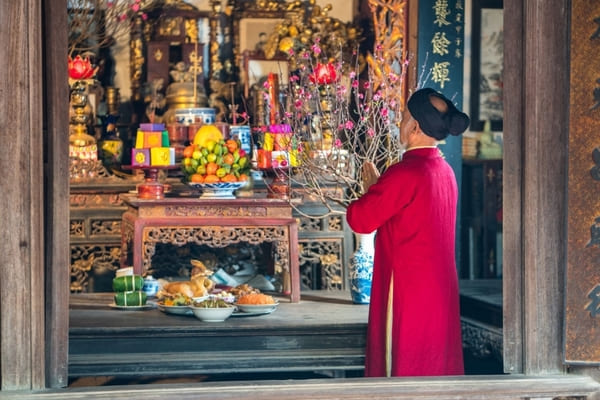 Maintaining an altar: Every Vietnamese household, from humble dwellings to grand pagodas, dedicates an altar space to their ancestors. This altar typically features photos of deceased family members, incense burners, offerings of food and drink, and fresh flowers.
Maintaining an altar: Every Vietnamese household, from humble dwellings to grand pagodas, dedicates an altar space to their ancestors. This altar typically features photos of deceased family members, incense burners, offerings of food and drink, and fresh flowers.
Strong family ties: The emphasis on filial piety strengthens family bonds, encouraging respect for elders and fostering a sense of responsibility towards future generations. Ancestral traditions and stories are passed down through generations, keeping cultural heritage alive and ensuring continuity.
2. Animist Beliefs in Vietnam
Animism, with its belief in the inherent spirituality of all things, has deeply influenced Vietnam’s cultural and spiritual landscape for centuries.
Mother Goddess: The “Mother Goddess,” often depicted as a nurturing figure associated with rice and fertility, is a central deity in Vietnamese animism. Shrines dedicated to her dot the countryside, receiving offerings and prayers for bountiful harvests and prosperity.
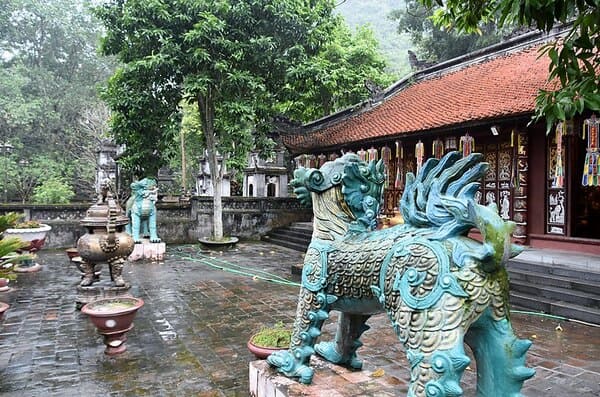
Each Vietnamese household typically has an altar dedicated to their ancestors and other protective spirits. Offerings of food, incense, and prayers are made to ensure harmony and well-being for the family.
“Phong thủy,” the Vietnamese term for geomancy, emphasizes harmony with the natural world. Houses and villages are often built in accordance with principles of balance and respect for the surrounding landscape and its spirits.
3. Burning votive paper – long-standing custom in Vietnam
Burning votive paper, also known as “giấy cúng” or “giấy vàng mã” in Vietnam, is a traditional practice deeply woven into the cultural and spiritual fabric of the country. It’s a way for people to express their respect and devotion to ancestors, deities, and spirits, offering them symbolic representations of material goods in the afterlife.
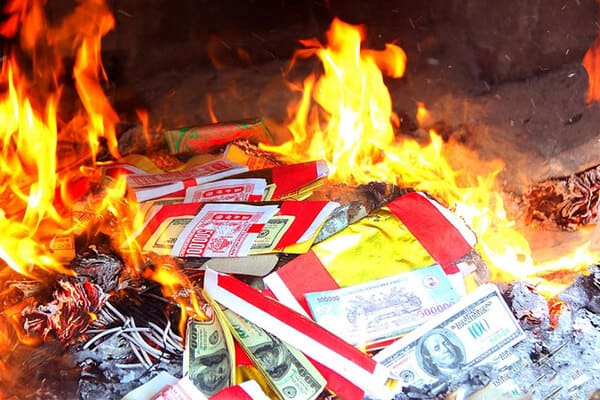
The most common type, often resembling Vietnamese or USD bills, symbolizing wealth and prosperity in the afterlife.
More intricate offerings can depict houses, cars, boats, and even everyday items like clothes and furniture.
Specific offerings for deities: Certain deities might have specific offerings associated with them, like horses for the God of War or gold bars for the God of Wealth.
4. Traditional wedding special customs in Vietnam
Vietnamese weddings are vibrant celebrations steeped in tradition, showcasing the country’s rich culture and customs. From the pre-wedding ceremonies to the final post-wedding rituals, every step is infused with symbolism and meaning.
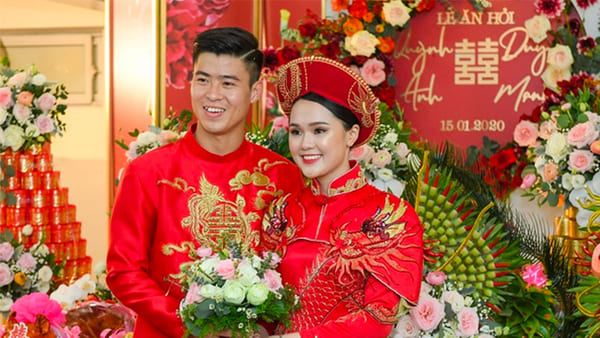
Lễ Dạm Ngõ (Engagement Ceremony): The groom’s family brought a gift basket of fruits and betel nuts to see the situation of the bride’s family. Then, they ask the bride’s family about the next procedures in the near future, and both sides will agree.
Lễ Cầu Hôn (Bride-asking Ceremony): The groom’s family formally asks for the bride’s hand in marriage, presenting offerings and seeking her parents’ consent.
Rước Dâu (Bride Procession): A lively procession, often accompanied by musicians and dancers, escorts the bride from her home to the groom’s, symbolizing the transition from her family to his.
Tiệc Mừng (Wedding Reception): A joyous feast is held with family and friends, featuring traditional Vietnamese dishes, toasts, and lively music.
5.Tet holiday – Lunar New Year reunion
It’s a time for loved ones scattered across the country to return home, reconnect, and celebrate together. The streets transform into vibrant spectacles. Houses are adorned with red lanterns and colorful decorations, symbolizing good luck and prosperity.
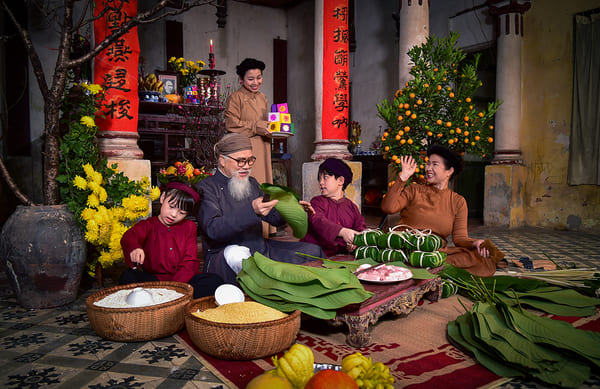
Tet involves a tapestry of customs and rituals:
Ancestral veneration: Families pay respects to deceased ancestors through elaborate altar offerings and ceremonies.
Lucky money: Red envelopes filled with money are gifted to children and unmarried adults, bringing good fortune in the new year.
Tet is a unique and cherished celebration, offering a window into Vietnamese culture, family values, and spiritual beliefs. Immerse yourself in its warm embrace, relish the joyous reunions, and embrace the hope and promise of a new year.
6. Visiting the pagoda by the beginning of year
Pagoda visits are seen as an opportunity to pay respects to deities and ancestors, seek blessings for health, prosperity, and good luck in the new year, and cleanse oneself of negativity from the past year. Pagodas are imbued with a peaceful and serene atmosphere, offering a break from the festive bustle of Tet and a space for personal reflection.

Be prepared for larger crowds visiting pagodas during Tet, especially on the first few days. Patience and courtesy are key. Offerings: Many people bring offerings like flowers, fruits, incense, and votive paper to show gratitude and seek blessings. Respectful attire is recommended, covering shoulders and knees.
Above is the entire content about Vietnamese customs and traditions. Hope to provide you with useful informative. Hope you soon experience and feel Vietnamese customs and traditions!




Tin Tức mới nhất
[5 minutes] Learn about all the handicrafts in Vietnam
Handicrafts in Vietnam are famous for their beauty, quality and tradition. It’s a great way...
5 useful information about Vietnam water puppets
Vietnamese water puppetry is a fascinating art form with a rich history and unique appeal....
16 traditional festival in vietnam [Overview]
Do you know traditional festival in Vietnam? If you don’t know or lack information, please...
5 National Costume Vietnamese [can not be ignored]
Vietnamese national costumes are very diverse and rich, with materials, styles and costume patterns that...
Traditional culture in Vietnamese [10 minutes to know it all]
Traditional culture in Vietnamese is a diverse picture , rich history, and a deep connection...
Customs and traditions of Vietnam [6 important notes]
What are the special customs and traditions of Vietnam? This is a country with more...